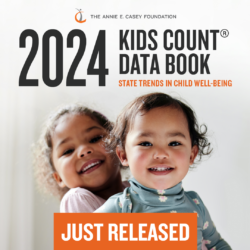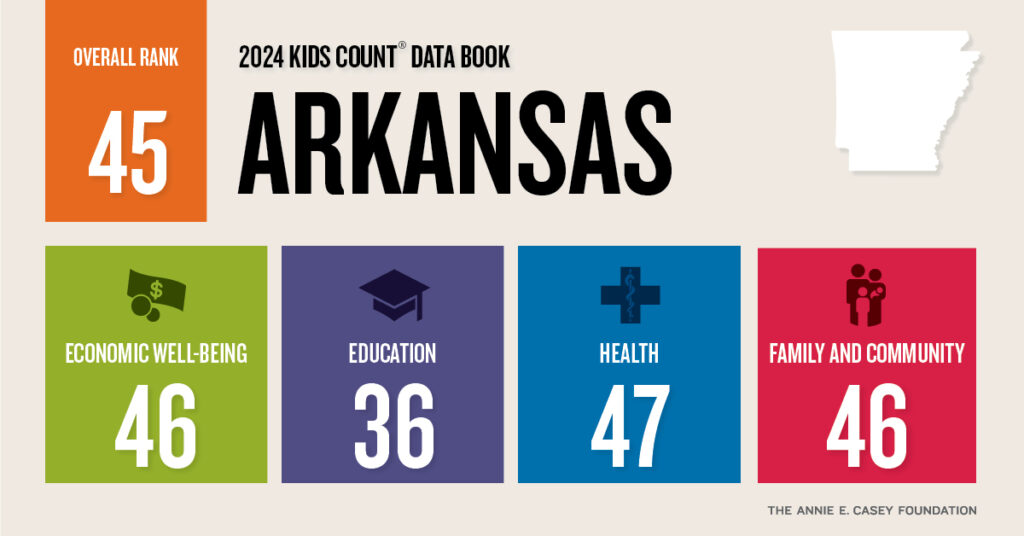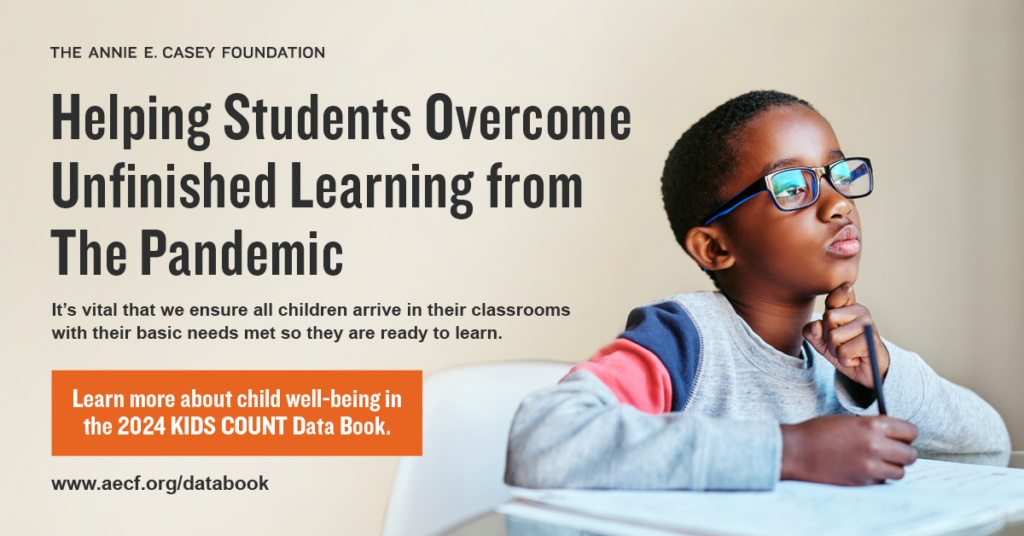
State Advocates Urge Focus on Equipping Kids to Learn
Arkansas ranks 45th in child well-being, according to the 2024 KIDS COUNT® Data Book, a 50-state report of recent data developed by the Annie E. Casey Foundation analyzing how kids are faring in post-pandemic America. The data show Arkansas leaders must do more to protect children and prepare them to learn so they can flourish in adulthood.
Since before the pandemic, very little has improved in terms of outcomes for children in Arkansas, and some outcomes have gotten worse. According to the rankings, one of the outcomes that has worsened is the number of teenagers ages 16-19 that are neither in school nor working (11% in 2022, up from 7% in 2019). Also, child and teen deaths in Arkansas increased 26% from 2019 to 2022. In this year’s report Arkansas ranks 46th in child and teen deaths, with a rate of 44 per 100,000.
Additionally, there was:
- No improvement in our state’s child poverty rate (22%)
- No improvement in the percentage of children living in families where no parent has full-time, year-round employment (29%)
- An increase in the percentage of children in households that spend more than 30% of their income on housing (25% in 2022, up from 22% in 2019)
- An increase in the percentage of 3 and 4 year olds not in school (57% in 2018-22, up from 52% in 2013-17)
- An increase in fourth graders not proficient in reading (70% in 2022, up from 69% in 2019) and eighth graders not proficient in math (81% in 2022, up from 73% in 2019).
Fortunately, Arkansas did see improvements in the Family and Community domain. For example, we have a smaller percentage of children in single-parent families (36% in 2022, down from 37% in 2019), a smaller percentage of children living in high-poverty areas (11% in 2018-22, down from 14% in 2013-17). Our teen birth rate improved, with 25 teen births per 1,000 in 2022, compared to 30 per 1,000 in 2019. However, Arkansas’s teen birth rate is still the second highest in the nation as the national teen birth rate was 14 per 1,000 in 2022.
We have to look at the entire picture of what life is like for Arkansas’s children. So many of our children are living in poverty. Too many are dying young or giving birth before adulthood. Arkansas’s reading and math proficiencies have been of concern for many years at Arkansas Advocates. They are a symptom of our state’s overall poverty and underinvestment in our public schools. All of these factors taken together may also predict a future workforce that’s less able to help sustain Arkansas’s key industries like health care and education.
Each year, the Data Book presents national and state data from 16 indicators in four domains — economic well-being, education, health, and family and community factors — and ranks the states according to how children are faring overall. Notably, state averages mask disparities that affect students of color, kids in immigrant families and children from low-income families or attending low-income schools. For example, students receiving free lunches, a marker of low family incomes, score worse on their 4th grade reading and 8th grade math proficiencies.
Arkansas’s overall rank is 45, with an Economic Well-Being rank of 46, an Education rank of 36, a Health rank of 47, and a Family and Community rank of 46. Arkansas’s outcomes were worse than the national average in 13 out of the 16 indicators. We are ranked in the bottom 10 states on eight indicators.

In its 35th year of publication, the KIDS COUNT® Data Book focuses on students’ lack of basic reading and math skills, a problem decades in the making but brought to light by the focus on learning loss during the COVID-19 pandemic. Unprecedented drops in test scores from 2019 to 2022 amounted to decades of lost progress.

The Casey Foundation report contends that the pandemic is not the sole cause of lower test scores. Educators, researchers, policymakers and employers who track students’ academic readiness have been ringing alarm bells for a long time. U.S. scores in reading and math have barely budged in decades.
These declines will result in major harm to the nation’s economy and to our youth as they join the workforce. Up to $31 trillion in U.S. economic activity hinges on helping young people overcome learning loss caused by the pandemic. Students who don’t advance beyond lower levels of math are more likely to be unemployed after high school. One analysis calculates the drop in math scores between 2019 and 2022 will reduce lifetime earnings by 1.6% for 48 million pandemic-era students, for a total of $900 billion in lost income.
The Foundation recommends the following:
- To get kids back on track, we must make sure they arrive at the classroom ready to learn by ensuring access to low- or no-cost meals, a reliable internet connection, a place to study and spend time with friends, and high-quality teachers and counselors.
- Expand access to intensive tutoring for students who are behind in their classes and missing academic milestones. Research has shown the most effective tutoring is in person, high dosage and tied directly to the school. Arkansas data show the biggest gaps that need to be addressed are in math and reading for English Language Learners.
- States and school systems should address chronic absence, so more students return to learn. While few states gather and report chronic absence data by grade, all of them should. Improving attendance tracking and data will inform future decision-making. Lawmakers should embrace positive approaches rather than criminalizing students or parents due to attendance challenges, because they may not understand the consequences of even a few days missed.
- Policymakers should invest in community schools, public schools that provide wraparound support to kids and families. Natural homes for tutoring, mental health support, nutritional aid and other services, community schools use innovative and creative programs to support young learners and encourage parent engagement, which leads to better outcomes for kids.
Arkansas Advocates additionally recommends the following:
- Invest in early childhood education so that kids are prepared for the rigors of K-12 and expand access to out-of-school programs that reinforce lessons taught in school in safe and supportive environments.
- Invest public dollars in programs that make and keep kids healthy. Arkansas needs to reverse the troubling increase in uninsured children.
- Investigate the increase in child and teen deaths and invest in solutions.
The 2024 KIDS COUNT® Data Book is available at www.aecf.org. Additional information is available at www.aecf.org/databook.
